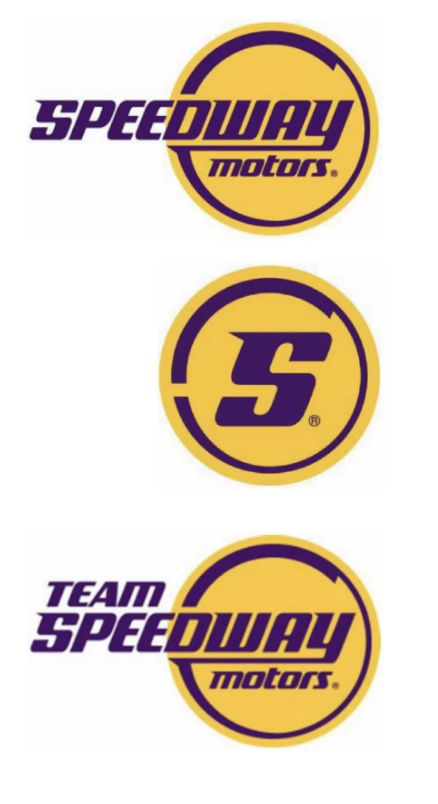The plaintiff is Speedway Motors, an outfit located in Nebraska, a state with an inspiring motto ("Equality Before the Law") and a baffling nickname (the "Cornhusker State"). Speedway Motor's website includes a section that sells "Drag Racing Parts." However, the wide variety of lubricants, sealants and hose available for purchase are not likely to tempt the likes of Shangela, Latrice Royale or the Reverend Silky Nutmeg Ganache. Which makes sense, since Speedway Motors sells parts for race cars and hot rods. Racers, start your engines.
In 2018, Speedway engaged a marketing firm to create new company logos "that symbolized the racing and performance automotive industries while still referencing classic features of the Speedway Motors brand." The final designs are shown below.

In 2018, Speedway's applications to register the logos were denied by the Copyright Office on the grounds that the logos "lack[ed] the authorship necessary to support a copyright claim." A year later, Speedway sought reconsideration, and the Copyright Office upheld its initial denial, noting that Speedway's logos fell "into a narrow area where admittedly independent efforts are deemed too trivial or insignificant to support a copyright." In 2020, the Copyright Office Review Board affirmed the denial, concluding that the logos, viewed as a whole, were insufficiently creative because they consisted only of "'wording' 'mere scripting or lettering, either with or without uncopyrightable ornamentation,' 'spatial placement' of elements, and the 'uncopyrightable and mere use of color, frames, borders or differently sized font'" (citing U.S. COPYRIGHT OFFICE, COMPENDIUM OF U.S. COPYRIGHT OFFICE PRACTICES § 913.1 (3d ed. 2017)). Speedway commenced an action in the Federal District Court in Nebraska, challenging the Copyright Office's decisions as arbitrary and capricious under the Administrative Procedure Act, 5 U.S.C. §§ 701-706.
The issue before the court was whether the logo designs were sufficiently original to be subject to registration as pictorial, graphic, and sculptural works. 17 U.S.C. § 102(a). Originality is a constitutional requirement and represents the "sine qua non" of copyright protection. "Original, as the term is used in copyright, means only that the work was independently created by the author (as opposed to copied from other works), and that it possesses at least some minimal degree of creativity." Feist Publications, Inc. v. Rural Tel. Serv. Co., 499 U.S. 340 (1991). Here, there was no dispute that Speedway's marketing firm had independently created the logos; the question was whether the designs met the admittedly low threshold for creativity to be eligible for copyright protection. (A standard low enough to be fairly summarized by this classic tagline of yesteryear: "A Little Dab'll Do Ya".)
The court held that the Copyright Office had not abused its discretion or acted in an arbitrary or capricious manner and granted its motion for summary judgment.
First, the court noted that "whether a work is subject to copyright turns on how a work is perceived." Accordingly, it was not relevant that Speedway's marketing firm had intended that the circle line art in the logos and the "speed lines" in the text would give the impression of "a rolling motion and acceleration"; the relevant inquiry is the effect that the marketing firm actually achieved with its design. (In other words: "Try not. Do. Or do not. There is no try.")
Second, the Copyright Office's characterization of the logos' individual elements as unregisterable (e.g., circles, a single letter, and short phrases) was not an abuse of discretion. The Copyright Office's longstanding position is that basic shapes, typeface and lettering are generally not subject to registration. Here, the "Office examined the logos, considered Speedway's arguments in favor of copyright, and articulated its reasons for concluding (1) the stylized purple band was still, in essence, a circle, and (2) the text, though artistically rendered, was still typeface."
Third, the Copyright Office did not abuse its discretion in holding that the selection and arrangement of the individual unregisterable elements (such as the stylized purple band, the artistically rendered text, and the deliberately selected shades of yellow and purple) failed to satisfy the originality requirement. The Copyright Office explained its conclusion:
"Looking at each [logo] as a whole, only two solid colors are used, and there is no shading or gradient use of colors. Although the purple band within the yellow circle is stylized and has different widths, it is still essentially a circle band within a larger circle that follows the outline of the larger circle. Placing a business name on top of a geometric shame is a "garden variety" logo configuration that is not entitled to copyright protection."
The court found this rationale "satisfactory."
Finally, the court rejected Speedway's argument that the Copyright Office's refusals here were inconsistent with prior decisions granting protection to corporate logos. The Copyright Office's long standing practice is that the determination of copyrightability is made on a case-by-case basis, and that prior decisions to register a particular work have no precedential value. (See U.S. COPYRIGHT OFFICE, COMPENDIUM OF U.S. COPYRIGHT OFFICE PRACTICES § 309.3 (3d ed. 2017).) Moreover, the court found that the Copyright Office had provided a satisfactory explanation for why the logos it had previously registered were more creative than Speedway's logos - including, for example, because the registered logos used white space, shading, and gradient colors to provide the illusion of movement or three-dimensionality that was not present in Speedway's submissions. Moreover:
"The Court further notes that this is not a race to the bottom. Even if the Copyright Office had previously approved an application for copyright for a work that arguably displayed less creativity than Speedway's logos, that does not mean that Speedway has satisfied its legal burden. The Copyright Office has undoubtedly, over its 150-year-long existence, approved applications for works that do not satisfy the creativity requirement. That does not mean that the Copyright Office's denial of Speedway's applications were an abuse of discretion or otherwise not in accordance with law."
(In other words: "The greatest teacher, failure is.").
Speedway Motors, Inc. v. Perlmutter, 2021 WL 3511134 (D. Nebraska Aug.10, 2021)

This alert provides general coverage of its subject area. We provide it with the understanding that Frankfurt Kurnit Klein & Selz is not engaged herein in rendering legal advice, and shall not be liable for any damages resulting from any error, inaccuracy, or omission. Our attorneys practice law only in jurisdictions in which they are properly authorized to do so. We do not seek to represent clients in other jurisdictions.
